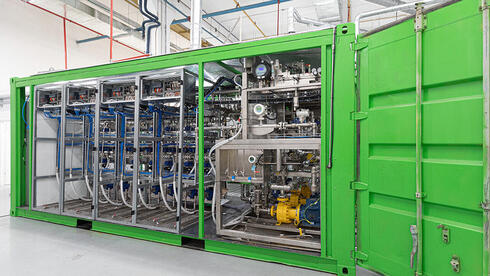Revolutionizing Green Hydrogen Production: Technion's Breakthrough in Decoupled Electrolysis System
Key Ideas
- Technion researchers unveil Decoupled Water Electrolysis method, separating hydrogen and oxygen production to slash costs and adapt to renewable energy fluctuations.
- H2Pro, a company commercializing the technology, aims to scale up industrial production to meet global hydrogen demand, potentially transforming the market.
- DWE systems, with internal batteries to absorb electricity fluctuations, offer a promising solution for green hydrogen production aligned with renewable energy sources.
- Green hydrogen production could revolutionize heavy transport and industrial sectors, reducing fossil fuel dependency and contributing to a sustainable energy future.
Researchers at the Technion – Israel Institute of Technology in Haifa have introduced a groundbreaking method for producing green hydrogen called Decoupled Water Electrolysis (DWE). This innovative system eliminates the need for a membrane in the electrolysis process, allowing for greater flexibility in adapting to the fluctuating nature of renewable energy sources like solar and wind. The research, led by Prof. Avner Rothschild and Prof. Gidi Grader, along with other collaborators, has led to the establishment of H2Pro, a company focused on commercializing this technology. The new DWE method separates the production of hydrogen and oxygen into different times or cells, reducing risks and costs associated with traditional electrolysis setups. The incorporation of internal batteries in DWE systems helps mitigate fluctuations in electricity supply, making them well-suited for renewable energy integration. The potential impact of this advancement is significant, as global demand for hydrogen continues to rise. Commercializing green hydrogen could have a transformative effect on the global energy market, particularly in sectors like heavy transport, steel, and fertilizer production. The scalability of DWE systems to industrial production is a key focus, with the goal of meeting the growing demand for green hydrogen. Prof. Rothschild envisions green hydrogen replacing a substantial portion of fossil fuel usage, emphasizing the importance of adapting electrolysis systems to align with renewable energy sources. The technological advancement presented by DWE offers a promising pathway towards a sustainable energy future, with the potential to revolutionize various industries and contribute to reducing carbon emissions.
Topics
Production
Renewable Energy
Technology
Innovation
Energy Transition
Research
Economics
Global Markets
Industry
Latest News
